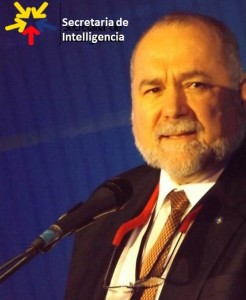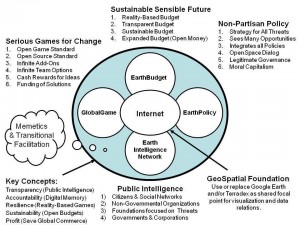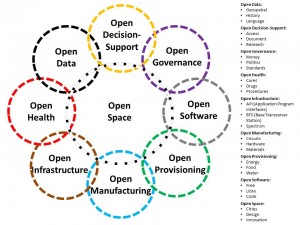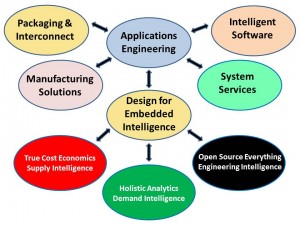
استخدام جوجل ترجمة للقراءة باللغة العربية
使用谷歌翻译在中国阅读
Использование Google Translate для чтения на русском языке
Google Türkçe Oku Çevir kullanın
SHORT URL:
http://tinyurl.com/VP-OSA
8 Oct 2015 updated 8 Dec 2015
MEMORANDUM FOR VICE PRESIDENT OF THE UNITED STATES OF AMERICA
SECRETARY OF STATE
SECRETARY OF DEFENSE
DIRECTOR, OFFICE OF MANAGEMENT AND BUDGET
ADMINISTRATOR, US AGENCY FOR INTERNATIONAL DEVELOPMENT
SUBJECT: Supporting the President’s Interest in 2015 Defense, Diplomacy, and Development Innovation – the Open Source (Technologies) Agency, Digital Deserts, & Global Stabilization
Inspired by the Secretary of Defense and his 11 September 2015 internal call for ideas related to the convergence of technological innovation with defense, diplomacy, and development objectives, an Open Source (Technologies) Agency is proposed. This agency, twice discussed during the past fifteen years within the Office of Management and Budget (OMB) (in an earlier information-focused incarnation), is now proposed as a comprehensive innovation engine that addresses nine distinct open source technology groups itemized below:[1]
Open Data
Open Decision-Support[2]
Open Governance
Open Health
Open Infrastructures
Open Manufacturing
Open Provisioning
Open Software
Open Space
The Problem: At a meta-scale, the common defense, diplomacy, and development (D3) challenge is the “digital deserts” that are also coincident with energy, water, and food scarcity while being a primary point of origin for illegal immigrants inclusive of criminals and terrorists.
At the intermediate scale, our defense, diplomacy, and development efforts cannot achieve their full potential, both within our Whole of Government context and multinationally, for lack of affordable, inter-operable, scalable and secure information-sharing and sense-making tools that allow holistic analytics, true cost economics, and open source everything engineering (OSEE) to be applied to the ten high level threats to humanity.[3]
At a strategic scale, despite some excellent thinking in relation to Sustainable Development Goals (SDG) and related US initiatives, the reality is that donor promises are insufficient and often fail to materialize, and the current development paradigm – inherently bureaucratic with little accountability or coherence, cannot do the job – less than 20% of the funds and often as little as 1% — actually arrive at the village level. The current industrial-scientific paradigm is not affordable, not inter-operable, and will not scale to address the needs of the five billion poorest in time to avoid a climate change collapse that makes today’s illegal immigration look like the thin stream that it is – we envision tens of millions of displaced persons moving north – many of them violent –in our future, absent a radical change in how we do the business of D3.
The Idea: An Open Source (Technologies) Agency funded by defense, under diplomatic auspices, and focused on a mix of Whole of Government and multinational information-sharing and sense-making with a digital Marshall Plan emphasizing Open Source Provisioning (energy, water, shelter, food) as well as Open Infrastructures (free cellular and Internet), will quickly and radically enable leap-frog innovation that stabilizes and reconstructs at a local to global scale.
This idea is directly responsive to both past Defense Guidance, and to the State-USAID Joint Strategic Plan 2014-2017, particularly goals 1.2 (inclusive economic growth reducing extreme poverty and improving food security), 3.2 (clean energy helping transition to a cleaner global economy), and 5.1 (enable more effective influence operations). With respect to digital deserts, this idea would for the first time aggregate research, development, and implementation of all the opens relevant to connecting, empowering, and stabilizing the five billion poor.
Two implementation elements are proposed, to be co-located on the South-Central Campus adjacent to the Department of State, the U.S. Institute for Peace, and George Washington University, with additional nodes to be funded elsewhere (NYC, Nairobi, etc.) by others:
D3 Information Bureau. This multinational information-sharing enterprise would be manifest in a United Nations Open-Source Decision-Support Information Network (UNODIN) that makes it possible to collect other people’s open source information and harmonize other people’s money at the village level (eliminating the 80% lost to intermediaries) while delivering open source innovation blueprints. Led by a US Ambassador as Assistant Secretary-General for Decision-Support, it would include a World Brain Institute with a Multinational Decision-Support Center (MDSC), a School of Future-Oriented Hybrid Governance, and a Global Game with embedded true cost economics information for testing each innovation idea.[4] In combination this information bureau will enable free public education one cell call at a time, and begin the process of engaging the world public in sustainability thinking, ultimately eradicating the average of 50% waste to be found across all policy areas from Agriculture to Energy to Water.[5]

D3 Innovation Bureau. This multinational open source everything engineering center (with a global network of applied scientists and engineers including many volunteers) would have a division for each of the nine open technologies categories, with initial emphasis to be placed on Open Provisioning – free energy, unlimited desalinated water using free energy, the rapid completion and global deployment of the Global Village Construction Set including pressed-brick shelters (the ultimate affordable housing), decentralized composting, and aquaponics – sustainable agriculture without pesticides. The existing “village in box” idea, for example, would enable the resettlement of one million Somalis now in UN resettlement camps across the region to be moved to northeastern Somalia (uncontested territory with unlimited dirt, sunlight, and seawater) at a cost of $500 per person, inclusive of transport, free cellular, and aquaponics.[6]

The specific early focus of the entire program will be Somalia, Syria, and Yemen, with a collaborative multinational executive including all of the stakeholders in the current emergency situation in the Middle East that is creating the mass migration to Europe. Our intent is to demonstrate how quickly and inexpensively Open Source Everything Engineering (OSEE) can advance the D3 capabilities in unconventional threat environments.
Resource Requirements: In the earlier information-focused incarnation, twice discussed in the past fifteen years within OMB (always contingent on the White House or a Cabinet Secretary endorsing the idea) the proposed funding was IOC $125M toward FOC $2B. This substantially enhanced variation of the idea, focused on sixty technology areas in nine groupings, is recommended for IOC $125M toward $3B, and would serve as the centerpiece for mobilizing and guiding over one trillion dollars in other people’s money toward achieving the SDGs.
Critical Next Steps: A single conversation among the principals to whom this memorandum is addressed should suffice to set this idea in motion. The Vice President would be ideal as chairman of the oversight board, with the new agency to be established as a sister agency to the Broadcasting Board of Governors (BBG), using non-reimbursable funding from DoD. A Smart Nation – Safe World Act is available as concise implementing legislation. The leadership team should be given full independence – this will fail if it is subordinate to any existing bureaucracy.[7]
Changing Public Diplomacy & Development with Science & Technology: In combination, the D3 Information Bureau and the D3 Innovation Bureau will change both public diplomacy and development by an order of magnitude. The D3 Information Bureau will enable free public education world-wide one cell call or hand-held screen at a time in 183 languages while providing tools for progressive activists to share information and practice extreme democracy – this will eliminate the “digital deserts” of concern to the White House. The D3 Innovation Bureau will make all science and technology “open” thus accelerating the elevation of the five billion poor with resilient villages, smart cities, and prosperous nations at peace, all able to eliminate the 50% waste – and the legacy legal barriers to innovation – characteristic of Western development.[8]

[1] The top three authorities on Open Source Everything are Robert Steele, author of The Open Source Everything Manifesto: Transparency, Truth, & Trust (North Atlantic Books, 2012); Dr. Marcin Jakubowski, founder of Open Source Ecology and the Global Village Construction Set, and Michel Bauwens, founder of the Peer to Peer Foundation. Their consensus on the nine open source categories within which sixty open source technologies are organized can be found at http://p2pfoundation.net/Category:Open_Source_Everything.
[2] Education, Decision-Support, and Research comprise Applied Collective Intelligence. The term decision-support is used to distinguish this category of information-sharing and sense-making across all boundaries, from Open Data, which is focused on raw multidisciplinary, multidomain, and multilingual data digitization at source. While decision-support is a synonym for “intelligence” in its proper construct of outputs rather than inputs, as used here the term is in no way associated with secret intelligence sources and methods. While the new agency would radically increase the amount of open source data and open source information that could be immediately provided to the high side, the information bureau focus is on creating open source technologies that enable local to global sharing of information among eight major information-producing and consuming “tribes:” academic, civil society including labor and religions, commerce especially small business, government especially local, law enforcement, media including alternative media and bloggers, military, and non-government/non-profit.
[3] LtGen Dr. Brent Scowcroft, USAF (Ret) was the US member of the UN High-Level Panel on Threats, Challenges, and Changes that reported out with A More Secure World: Our Shared Responsibility (United Nations, December 2004) with the following ten threats in the following priority order: 01 Poverty 02 Infectious Disease 03 Environmental Degradation 04 Inter-State Conflict 05 Civil War 06 Genocide 07 Other Atrocities 08 Proliferation 09 Terrorism 10 Transnational Crime. Our current information sharing and policy making capabilities are severely skewed toward threats 04 and 05, while neglecting all the others, particularly in relation to true costs over time and returns on investment. No one anywhere is focusing on integrated open source everything engineering.
[4] The UN White Paper is entitled Beyond Data Monitoring – Achieving the Sustainability Development Goals Through Intelligence (Decision-Support) Integrating Holistic Analytics, True Cost Economics, and Open Source Everything (Earth Intelligence Network, October 2014) online at http:tinyurl.com/EIN-UN-SDG.
[5] Agriculture: Nadia Arumugam, “UN Says Europe Wastes 50% of Fruit and Vegetables – and America Isn’t Must Better,” Forbes (4 October 2012), Dana Gunders, “Wasted: How America is Losing Up to 40 Percent of Its Food from Farm to Fork to Landfill,” National Resources Defense Council (August 2012); Energy: Barry Fischer, “US Wastes 61-86% Of Its Energy,” CleanTechnica (26 August 2013); Health: Michael Galper et al, “The price of excess: Identifying waste in healthcare spending,” PriceWaterhouseCoopers (April 2008); Military: Scot Paltrow, “Behind the Pentagon’s doctored ledgers, a running tally of epic waste,” Reuters (18 November 2013), Stockholm International Peace Research Institute, “The US spends more on defense than the next eight countries combined,” Peter G. Peterson Foundation (13 April 2014), Perry Chiaramonte, “War on waste: Pentagon auditor spotlights US billions blown in Afghanistan,” Fox News (28 July 2014); Water: Robert David Steele, “Water: Soul of the Earth, Mirror of Our Collective Souls,” Huffington Post (7 January 2011).
[6] An informal cost study is available. The point is that for the first time, someone actually thought through with modest precision what it would take to convert dirt, sunlight, and seawater into a habitat using an integrated approach to energy, water, shelter, food, and connectivity.
[7] The author’s biographies, testimonials, profiles, and production can be viewed at http://robertdavidsteele.com. A new web site funded by the Shuttleworth Foundation, Open Source Everything for the 21st Century – Creating a Prosperous World at Peace, was created on 1 December 2015 at http://ose-21.org.
[8] After publication of Robert Steele’s submission to the UN SDG Global 2016 Report, visible at http://tinyurl.com/SDG-OSEE, a major India-based NGO met with Robert Steele and after discussion a new briefing was produced that has been sent to India for consideration, visible at http://tinyurl.com/EIN-BRICS-OSEE. Separately one European foreign minister and one European defence minister are being asked to inquire of their counterparts as to the status of this memorandum. In the ideal, the USA would create an OSEE “hub” that would then interact with regional multinational-development OSEE hubs, achieving the SDG within a decade.
Written 8 October 2015. Delivered via Certified Mail to each office by 13 October 2015. Updated with graphics in December 2015.
DOC (5 Pages As Updated): D3 Innovation Memorandum 3.2
DOC (3 Pages As Delivered): D3 Innovation Memorandum 1.8
NOTE: Since the memorandum was developed new documentation has come available that shows examples proving that OSEE initiatives (projects) cost 10% to 25% as much as traditiional engineering projects. They can also be implemented more quickly across many communities because they are simpler as well as cheaper, and they are more sustainable because repairs can be made locally. With 3D printing now moving into mud construction as well as spare parts production and plastic recycling, a new industrial revolution is imminent.
See Especially:
Open Source Everything Engineering (OSEE) — a Nordic Manifesto
See Also:
BOOK: The Open Source Everything Manifesto: Transparency, Truth, & Trust
The Future: Recent “Core” Work by Robert Steele



